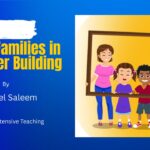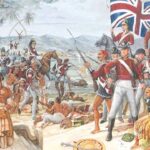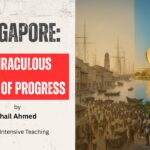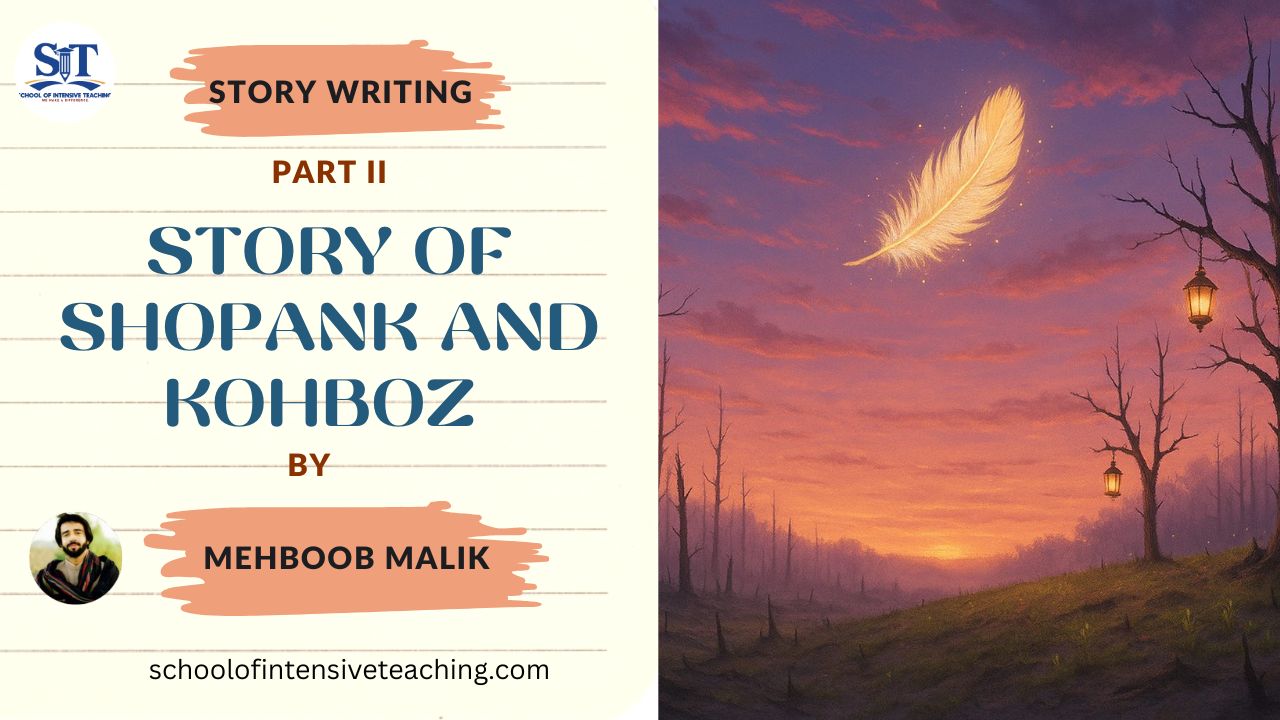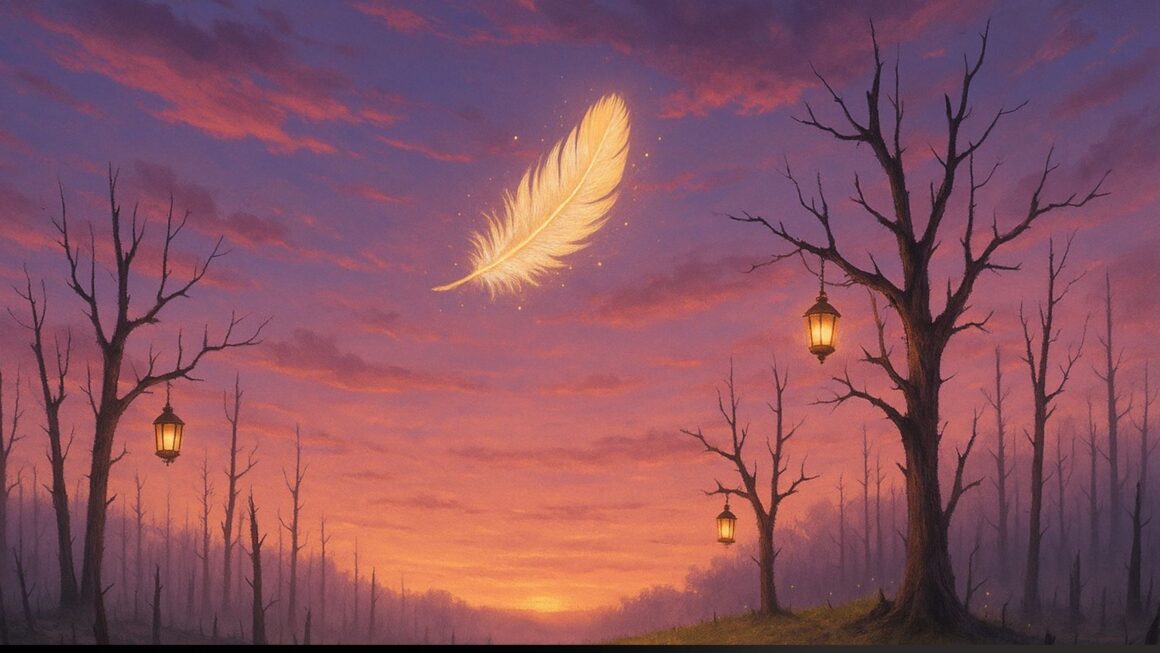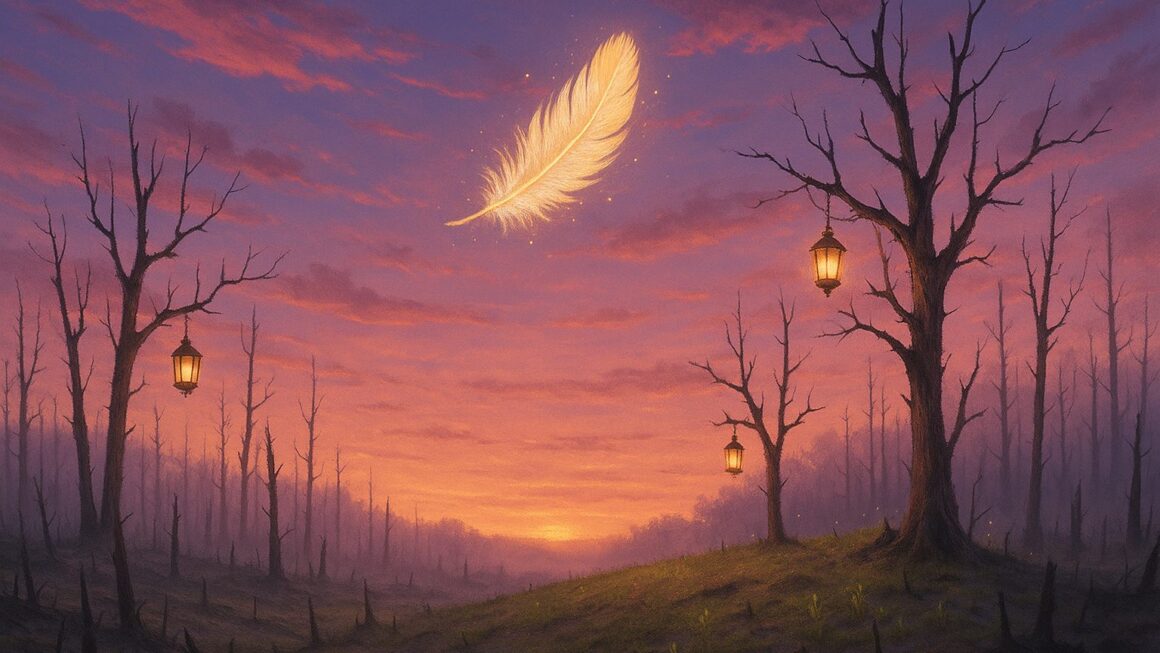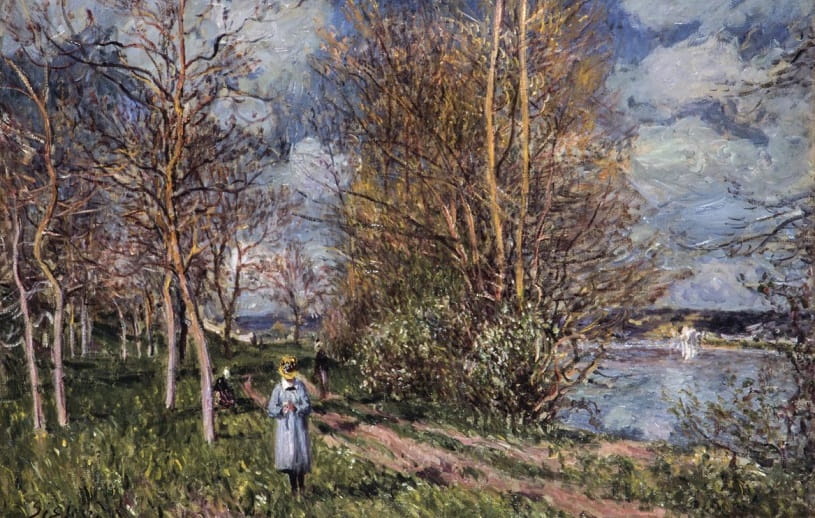The world, YES! The beautiful little world once was burning, and now it is bleeding, bleeding like a slit throat left to drain in silence. Every corner of it, not just of blood but of smoke so thick it chokes the lungs. It is bleeding as though a thousand storm clouds have burst upon Kech Kore, or Miraan Dam is no more. It is not that rain is failing but its rage. Everyone feels it. Children, women, and men—even the animals who can not speak—are all caught in something far worse than pain. Their lips tremble, eyes overflow, and their sobs and agony add to the flood rising around them.
Amid it all, the Earth moans, “Save me!” “Save me from this blood. I am drowning. I am saturated. I no longer need blood to feed trees, wild animals, plants, or mountains. I was never meant to drink death.” Far from this red ocean, Shopank sits alone, outside the crowd, asking questions to the wind and answering them with a voice that no longer hopes but only remembers. What he remembers is Khoboz’s voice. After listening to her behind the walls, he yearns to kiss and hug that wall. It is Shopank, not a ghost, not a boy, not a man, and even not a voice, who is just a shadow.
Days passed. Nights came and went. But Shopank did not move. His tiny body was tired from carrying the heavy weight of feelings that had nowhere to go. The glowing feather was gone, but the words it left behind kept spinning in his head like Muneer Momeen’s poetry. “You fly too close to a fire that was not made for you.” He whispered it to himself again and over again, each time hoping it would hurt less. But it did not. The pain grew deeper, sharper, and stronger. It was not just heartbreak; it was something dangerous, something cruel, something exactly tearing apart.
Shopank tried too hard to forget Khoboz. Not because of her inaccessibility but because of her friend who appealed to him to “Please save yourself from this agony and leave everything to Allah.” He held himself, thought, and struggled to survive. “This is foolish. No! There is no stupidity to love someone. Yeah! But there is fire everywhere. Peers are leaving you one after another. The world is falling apart. Why am I thinking about Khoboz?” The more he tried to forget her name and her memory, the more he burned inside like a secret flame. Her image and sight haunted him not only in the nights but also in his thoughts. Every sunrise looked like the colors of her wings. Every spark in the wind felt like a reminder that no matter how far she was, she had already become part of him.
Six months passed. In those months, every corner of the veiled city was echoing with the roar of the monster. Everyone was preparing to have a glance at Tayaaib. But Shopank was lost in his thoughts; perhaps time would heal him. It seamed time had paused as it did not heal but only taught him to hide the wound better. Outside, he smiled at the mountains and passed himself off being fine. But inside, he was broken. The monster had engulfed homes into hollow memory, and trees into skeletal prayers. The winds not only carried the dust but the wailing grief of those still searching through smoke and scream. The ground was full of cracks, not just from earthquakes but from hearts shattered by the cruelty of the Digital Boy. And Shopank’s cracks were invisible to everyone but himself.
Then, one evening, the sky became dull; night opened its mouth and finished the yellow light of the sun. Something inside him snapped. A voice, sharp, roaring, and loud, rose from the deepest part of his soul. “Enough! I cannot live like this. I cannot live without trying one more time. If I stay silent, I will regret it in my whole life. Whether she answers me or not, breaks me or not, I must speak.” The words terrified him, but they also gave him courage. For the first time in months, his body did not feel like chains; it felt like something more like John Aliyan’s truth, Ghalib’s words, and Faraz’s bravery.
This time, Shopank was in no mood for poetry in his message, no rhythm, no careful dance of heart, no coded signals. He did not care about sounding brave or wise. He sent his message with nothing but raw honesty. “Kohboz… I am not intending to claim you. I am not approaching because I deserve you. I grab your attention because I cannot breathe otherwise. I know I am just a poor shepherd, and even nothing but you are the flame. The flame that is both serenity and tempest. But even if it burns me, I need to say this: you have become the sky I look at when I forget how to live.”
Once the message left him, silence covered the whole city, yes, the city of the garden. His breath came on his lips. His thoughts became heavier than Al-Boriz. But this time, Shopank was not waiting for an answer to save him. No. He knew that sometimes the answer doesn’t come, and sometimes the answer is silence itself. But what mattered now was not whether Kohboz replied. He had found the strength to speak his truth, no matter how small he was compared to her. The wind felt lighter, his chest felt freer like the pain had transformed into something less cruel and more honest.
Hours and days passed like years. The fires still burned. But now the monster has become a vulture—the vulture who sips only pure blood. The skies still carried the cries of those who lost everything. The beautiful little world turned into a volcano that escapes none. But Shopank felt different now. His laughter no longer trembled with fear of rejection. Despite everything, he was still breathing. Because now he was habitual of this. But Khoboz was still dancing in his thoughts, dreams, goals, moments, and gatherings.
Kohboz did not reply that day. Not the day after. Not the weeks that followed. Shopank sometimes wondered if his message even reached her. Maybe she had seen it and chosen to stay silent. Perhaps she had not noticed it at all. Or maybe… her silence was the answer. A kind gentle way of saying, “ You are strong, but she is not destined to you.” And somehow, this did not break him the way it once did. He had already gone through the hardest thing and had come out, the fire inside his own heart. The world around him had changed since then. The mountains, forests, monster, and the sky—nothing looked the same anymore. But Khoboz was the same.
After waiting a long time, the reply came, not like a morning breeze, but like the smoke of distant village fire. Neither did it arrive in haste, nor did it stumble. It arrived like her: composed, graceful, gentle as the curve of her connected eyebrows but soaked in finality. “Shopank,” she wrote, “I understand. I did. And somewhere in the secret places of my heart, it trembled me. But let me not confuse you with kindness; this feeling you carry, this storm you bear inside, cannot find a home in me. Not because you are less, but because my heart does not need it. My world is already drowning, and I cannot save myself, let alone catch someone falling deeper.” The words, soft as honey, pierced sharper than any sword.
Shopank read it once, then again, and again over again each time, not to know, but to convince himself that Kohboz hates him. She did not show! Waiting for rage or cruelty in her tone so he could turn his love into hate, but there was none. Just her voice, serene and distant, like a sunset over the Makran coast, beautiful and unreachable. Once again, it was not a rejection dipped in anger; it was a geniality dipped in sorrow, as though EVEN SHE REGRETTED SAY NO. Her gentleness appeared worse. He closed his eyes and was lost in thoughts.
Yeah! It is the little world of theirs that once was a garden. Now, graves lay under thick, smokey clouds. The vulture was tired, tired of drinking blood. Because there were no names on the graves, only a little sand over hundreds of forgotten lives. The air in Little World did not carry laughter, happiness, dreams, and hopes anymore; it carried despondency and emptiness with each wall covered in pale color. And Shopank walked these lands with broken silence that threatened him more than vultures. In his eyes, there were no longer questions—just sorrow, silence, fear, blood, and smoke.
Shopank did not cry that night. He had already shortened every tear in him. Instead, he walked to the Gaddani Tayaaib, now a ghost of what it once was. He sat by its dry edges, touched the dust, and said, “This world is not a home anymore. It is a graveyard of unknown bodies and forgotten dreams.” The Tayaaib did not echo back. Only the wind became warmer, cruel, and barbaric in response, bringing him stories of lovers, poets, and stars—all brunt and buried under silence. Somewhere in that darkness, he finally understood; Khoboz’s rejection was not her cruelty; it was the final proof that this world is built to kill beautiful things with bloodbath hands.
Of this journey, now Shopank was no longer a loser. He stood again. Broken, yes. Bleeding, yes. Learn, yes. Yarning, yes. In these situations, he still was breathing. He did not seek love now, nor healing. He sought truth. A truth sharper than fire, colder than silence, and heavier than the sky. He carved her name on a stone, not as a memory, but as a mark of survival, push-up, and reminder of her. And then he whispered, “Kohboz may hate me, scold me, threaten me, cut contact with me, but I will not give up in search of her as vultures are in search of blood.” His laugh echoed in the wind, not joyful, not defeated, just soaked with memories of stars. And somewhere, far away, where the vulture’s fire met the endless sky, Shopank is in search of Kohboz.
Shopank was yarning, exactly yarning for both Kohboz and the little world.” Irrespective of these, he was digging something in his foundations. “Why is Kohboz so kind, so graceful, so strong, that she lifts me instead of needing me?” said Shopank. “Why does she belong to this broken world where humans are treated like beasts? But why? Shopank hit his head against the wall and kept asking questions. Then he laid the pathway and kept going, going and going till he disappeared in the crowd. He sat out in the sky and earth to find Khoboz and drag the vulture of the oppressed, broken, shattered little world.
Wait for Part III, where the silence thickens and truths awaken. Shopank’s journey takes a turn with both Khoboz and the situation of the little world. Stay tuned! The story is not over yet.
About the author:

Mehboob Malik
SIT ALumnus & Studying Sociology from UMTMehboob Malik hails from Panjgur, Balochistan. He is a SIT alumnus and a member staff. He writes on social issues.


